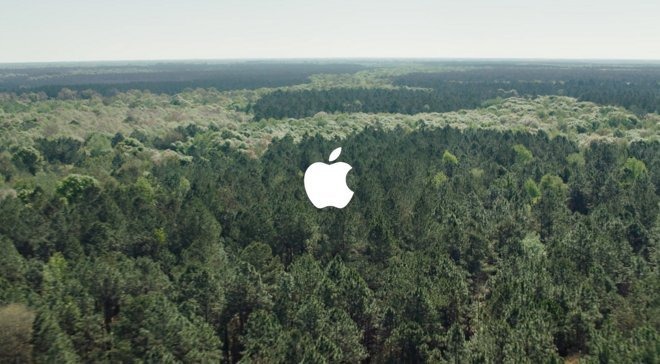Apple on Wednesday announced a pair of initiatives that will help reduce the carbon footprint of its Chinese manufacturing partners, saying its own operations in the region are now carbon neutral.
According to Apple, the two new programs will avoid production of 20 million metric tons of greenhouse gas between now and 2020, the equivalent of taking 4 million cars off the road for a year. The power program builds upon Apple's current environmental efforts in the region, which include solar plants and forest management.
"Climate change is one of the great challenges of our time, and the time for action is now," said Apple CEO Tim Cook. "The transition to a new green economy requires innovation, ambition and purpose. We believe passionately in leaving the world better than we found it and hope that many other suppliers, partners and other companies join us in this important effort."
Apple plans to offset energy used by its supply chain by building solar installations that will generate more than 200 megawatts of power in the northern, eastern and southern grid regions of China. That amount is equivalent to the energy used by more than 265,000 Chinese homes in a single year, Apple says.
In a related initiative, Apple is pushing its manufacturing partners to be conscious of energy consumption. The plan is to work with suppliers to build out clean energy facilities that will ultimately pump out more than 2 gigawatts of electricity when completed. Foxconn, for example, promises to offset the energy needs its Zhengzhou factory requires in final iPhone production by constructing solar installations capable of producing 400 megawatts of power. Construction is slated to start in the Henan Province and should be finished by 2018.
"We are excited to embark on this initiative with Apple. Our companies share a vision for driving sustainability and I hope that this renewable energy project will serve as a catalyst for continued efforts to promote a greener ecosystem in our industry and beyond," said Foxconn founder and CEO Terry Gou. "Sustainability is a core pillar in Foxconn's strategy and we are committed to investing in green manufacturing."
Finally, Apple announced that construction of its 40-megawatt solar projects in the Sichuan Province is complete. The amount of clean energy generated by these installations offset the needs of Apple's 19 offices and 24 retail stores in China. With the new solar installation coming online, 100 percent of Apple's operations in China and the U.S., and more than 87 percent of its worldwide operations, are powered by renewable resources.
"Being responsible, protecting air and water, and driving clean energy are at the heart of Apple's commitment to China," said Lisa Jackson, Apple's vice president of Environment, Policy and Social Initiatives. "These projects go beyond Apple's operations in China to help our suppliers adopt clean renewable energy."
 Mikey Campbell
Mikey Campbell







-m.jpg)






 William Gallagher
William Gallagher
 Andrew O'Hara
Andrew O'Hara

 Malcolm Owen
Malcolm Owen

 Brian Patterson
Brian Patterson
 Charles Martin
Charles Martin










10 Comments
Good Job... hope everyone will follow.
Their sustained and growing commitment to reducing carbon footprint reminds me that Apple Car -- if it comes -- is more than just a revenue-driver in Apple's eyes. It is an opportunity for Apple to drive environmental activism into the hands of consumers on a very large scale.
So Apple Store are closed to Carbon Neutral. Its Datacenter are going to be Carbon Neutral, And Now its operation AND Supply chain are closed to carbon neutral as well. I guess it wont be long before Apple can claim the world first Carbon Neutral Company. May be one day Apple could even do something similar for its partner carrier. ( Only paying electricity for iPhone users of coz ) And in doing so, they are pushing the world forward, a benefits that no one mentions and hard to measure.
This is a game-changer. Dozens of companies will follow. China will be better for it, and the world. This is also a fabulous of example of how corporate America -- at least, some important portion of it -- is driving deep change in countries like China and India by bring their best practices to bear via the local supply chains. Couldn't be a finer example of disavowal of the cynical (and uninformed) view that corporations are evil. Kudos to Cook and Jackson. (I wanted to get this in before the resident group of climate skeptics/deniers wanders in....)
This is a game-changer. Dozens of companies will follow. China will be better for it, and the world.
This is also a fabulous of example of how corporate America -- at least, some important portion of it -- is driving deep change in countries like China and India by bring their best practices to bear via the local supply chains. Couldn't be a finer example of disavowal of the cynical (and uninformed) view that corporations are evil.
Kudos to Cook and Jackson.
(I wanted to get this in before the resident group of climate skeptics/deniers wanders in....)
Hey anan, hoping to get into a friendly, productive discussion here. Not sure if you're referring to me at the end there or not, but either way, I don't see what's wrong with being skeptical. And it's not so much skepticism of the science, more so skepticism of how this science is being interpreted and promoted.
Anyway, from my experience, in general, I see climate change as something like a religion for atheists. If you don't subscribe to 100% to the dogma of climate change, you're cast aside as a 'denier' and a heretic. Seems pretty silly to me, especially where there are legitimate points of contention. FWIW, I'm a politically moderate agnostic; I don't see why everyone isn't this way, but that's another discussion.
In my view, environmental concerns deserve to be a huge priority, which is why the issue of climate change irks me so much. I don't understand why we expend the majority of our environmental resources on combating climate change, when, to me, there are many more, pressing issues that need to be addressed now. To me it is a tragedy, and huge mistake, to misplace resources like this. What is the point of addressing climate, which, according to studies (by climate change proponents), isn't going to have significant effects for 80-1000 years, when there will be little of the earth's ecosystem left to protect? Habitat destruction continues at an alarming rate (not only destroying carbon sinks that will buffer 'climate change', but also, in the destruction, releasing thousands of tons of CO2), yet we are focusing our energy on gaseous plant food?! Makes no sense. Not to mention other significant environmental issues: actual pollution, recycling, fishery destruction, waste disposal, invasive species, sustainability, etc.
The (simplistic) answer I get from climate change true believers is that since CO2 involves the whole world, that we are talking about destroying the entire earth ecosystem! Except, besides the point I made above (that it is already being destroyed, right NOW, and we are doing little about it), who is to say that warmer temps and increased CO2 is a bad thing? There is tremendous confirmation bias from the pro climate change studies (almost all of which peddle for donations on their websites), which almost never account for the compensatory ability of the planet, as if the climate has never changed before. It is common sense that increased temp + increased CO2 = more plant matter, and in most environments, is better for the ecosystem (for example, the tremendous biomass and species diversity at the equator). Not to mention that 70% of the earth's oxygen is created by blue green algae in the oceans, which I'm sure wouldn't mind the extra temp and CO2 (i.e. plant food).
In the end, even if we are to take the scientific studies at their word, they typically do not actually predict the doom and gloom we constantly hear in the media. Basically, anything that is affected by warmth, moisture, and CO2 is cause for alarm: more mold! (um, ok), killer hurricanes! (hardly), drought! (nope, it's El Nino), food nutrient depletion! (nope, the study showed that increased CO2 increases food mass, which decreased the relative mineral content, which is no surprise, and easily addressed by fertilization and/or supplementation), on and on.. The media takes the scientific studies, assumes the worst case scenario, and adds a bunch of empty rhetoric that was never used by the scientists.
For example, the "killer hurricanes" we're led to believe will doom us all. If I'm remembering correctly, the source I'm using is one you referred to before; in that case, I claimed that hurricanes were decreasing (which they are), but you pointed out that they are increasing in intensity (which was new to me up to that point). However, it's not increasing much: (http://www.gfdl.noaa.gov/global-warming-and-hurricanes) in a review of available evidence, last revised 9/30/2015, the GFDL, which works cooperatively with the NOAA and makes contributions to the IPCC, stated:
"It's premature to conclude that human activities--and particularly greenhouse gas emissions that cause global warming--have had a detectable impact on Atlantic hurricane or global tropical cyclone activity."
And:
In bold: "In short, the historical Atlantic hurricane activity does not provide compelling evidence for a substantial greenhouse warming induced long-term increase."
They also stated:
"Anthropogenic warming by the end of the 21st century [thats 85 YEARS FROM NOW] will likely [meaning >66% chance] cause tropical cyclones globally to be more intense on average (by 2 to 11% according to model projections for an IPCC A1B scenario)."
This is just one example.
In summary: It seems obvious to me that the focus on CO2 (gaseous plant food) is doing real harm to the environment by diverting resources that would be better spent on more pressing environmental issues (e.g. habitat destruction), which we can actually do something about (even if every country in the world was willing to make significant economic sacrifices tomorrow, I highly doubt it would have much of an impact on Earth's CO2 content).
Of course, this is not a critique of Apple, which should be commended for taking so many proactive environmental measures. Sorry if I went a bit OT.